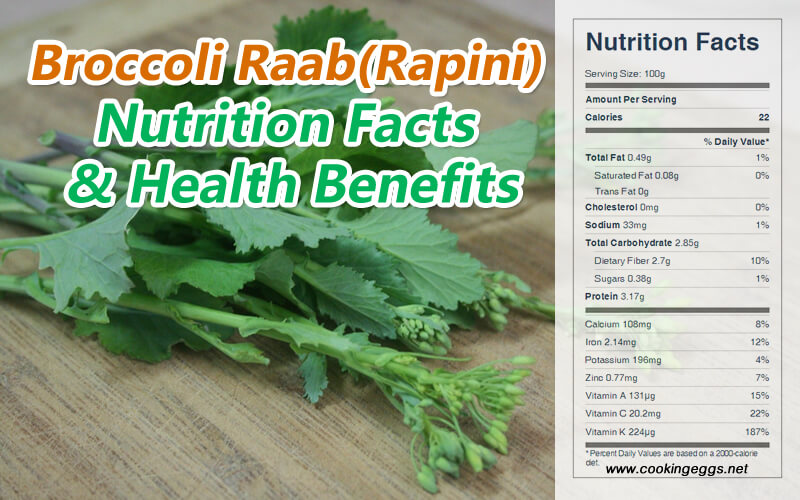Broccoli Raab (Rapini) Nutrition Facts & Health Benefits
Rapini or broccoli raab (also spelled rabe), is a green cruciferous vegetable. It resembles small heads of broccoli and is one of the favorite Mediterranean greens.
Rapini belongs to the Cruciferous family, in the genus Brassica, and closely resembles napa cabbage and turnips. Rapini has many spiked leaves that surround clusters of green buds that resemble small heads of broccoli. Small, edible yellow flowers may be blooming among the buds.
Nutritional Value of Broccoli raab
Rapini contains 92% water, 2.8% carbohydrates, 3.2% protein, and negligible amounts of fat. Rapini is a source of vitamins A, C, and K, as well as potassium, calcium, and iron.
In a 100-gram reference amount, raw broccoli raab supplies 22 calories, 2.85 g carbohydrate, 3.17 g protein, 0.49 g fat, 2.7 g dietary fiber, 2620 IU vitamin A, 20.2 mg vitamin C, 224 µg vitamin K, 83 mcg folate, 108 mg calcium, 2.14 mg iron, 196 mg potassium, and 0.395 mg manganese.

Raw Broccoli raab Nutrition Facts Label
Health Benefits of Broccoli raab
Broccoli raab is a member of one of the brassica families—which includes such nutritional and health heavyweights as cabbage, broccoli, brussels sprouts, bok choy, and kohlrabi. And it shares many of their amazing health benefits. Like all cruciferous vegetables, broccoli rabe contains flavonoids, sulforaphane, and indoles, which help prevent cellular degeneration and may help protect against cancer. Sulforaphane, for example, has been shown to induce powerful enzymes that protect rodents from tumors. And flavonoids in general have extensive biological properties that promote human health and help reduce the risk of disease.
Broccoli rabe contains more than 2620 IU of vitamin A, including 1570 mcg of beta-carotene. There are 1120 mcg of lutein and zeaxanthin, which are superstars of eye nutrition and are being investigated for their ability to fight macular degeneration, the number-one cause of blindness in elderly adults. Much of the β-carotene from the diet is converted into retinoids and provides vitamin A function. Some unconverted carotenoids also reach the blood and tissues, where they may function as antioxidants. In addition, Vitamin A is important for the immune system because it is needed for the differentiation of cells into the various types of immune cells.
Rapini is a rich source of vitamin K , in a 100 g serving of this vegetable supplies 224 μg of this essential vitamin, which is equivalent to almost 187% of the daily recommended intake. Vitamin K functions as a coenzyme for biological reactions involved in blood coagulation and bone metabolism. It may have a role in osteoporosis and vascular health. Research has found that high intakes of vitamin K help to stop bone loss in people with osteoporosis. The sources of Vitamin K in our diet are green leafy vegetables such as spinach, broccoli, brussels sprouts, kale, collard greens, lettuce, and okra.
In 100 g of broccoli rabe, it contains almost 22% of the recommended daily allowance of vitamin C, which plays a significant function in the human body. Vitamin C is a powerful water-soluble antioxidant that scavenges free radicals and boosts immunity. The production of certain hormones and of neurotransmitters and the metabolism of some amino acids and vitamins require vitamin C. This vitamin also helps the liver in the detoxification of toxic substances in the system and the blood in fighting infections.
Broccoli raab contains a substantial amount of folate (21% of the daily value). Folate, also known as vitamin B9 and folacin, is one of the B vitamins. Folate is required for the body to make DNA and RNA and metabolise amino acids necessary for cell division. As humans cannot make folate, it is required in the diet, making it an essential nutrient. Folate deficiency causes poor growth, abnormalities in nerve development and function, anemia, diarrhea, and inflammation of the tongue.
Broccoli raab also contains calcium; its function in maintaining bone and tooth health is also critical to cell signaling, blood clotting, muscle contraction, and nerve function. Calcium is the most abundant mineral in the body. It is important for the maintenance of bones and teeth where it is part of a solid crystalline material called hydroxyapatite. Inside the muscle cells, the presence of calcium allows the two muscle proteins, actin and myosin, to interact to cause muscle contraction. Calcium also plays a role in blood pressure regulation and blood clotting.